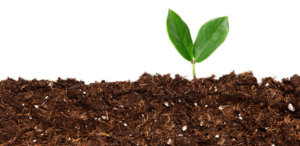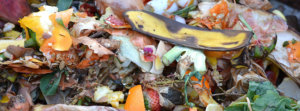July 1 deadline looms, but don’t panic: It’s just compost
 By Chea Waters Evans
By Chea Waters Evans
Before this year’s July 4 barbecues, Vermonters are going to have to figure out what they’re going to do with their leftovers before the holiday even starts. Act 148, the compost portion of the state’s Universal Recycling and Compost Law, takes effect on July 1. The law bans food scraps from landfills to reduce methane gas that is released into the atmosphere as food decomposes. People who aren’t familiar with composting have a lot of questions. What exactly do I do with my food scraps? Will I get bears in my yard? What is compost in the first place? Why are they making me do this? Will I get in trouble if I don’t?
At the June 8 Selectboard meeting, Sarah Reeves, the executive director of the Chitttenden Solid Waste District, presented the organization’s annual budget and then fielded questions from board members; the conversation turned to composting with Louise McCarren confessing that the concept was making her “cranky.” She expressed concern that adding another element to the burden of people already dealing with coronavirus would be too much. “I am just worried about the stress this is going to put on people at this point,” she said.
Reeves assured her and the rest of the board that there are many options and resources available for compost newbies— and ways to get rid of food scraps for those who aren’t interested in dealing with them at home.

“Believe me, we are all facing certain levels of stress,” Reeves said, “and it does seem like it’s one more thing. We will absolutely help you figure out what some options might be to help you comply.” She said that CSWD employs outreach and communication staff who operate a hotline for anyone who has questions about food scrap options; they also offer virtual workshops for compost education and subsidized compost and food scrap equipment.
Another good resource for Charlotters is Abby Foulk. She is Charlotte’s resident composting expert who pioneered the compost program at Charlotte Central School and has been the town’s Chittenden Solid Waste District representative for years. She’s enthusiastic about the food scrap ban.
“Kudos to Vermont for Act 148 Universal Recycling law, which is all about resource recovery and waste reduction!” she said. “Kudos to Vermonters who will separate their food scraps and keep them out of the landfill!”
Reeves acknowledged during her Selectboard presentation that options are currently somewhat limited for Vermonters who are unable or unwilling to compost. “It has been a point of contention with the [trash] hauling community for years,” she said. After haulers objected to being obligated to provide food scrap pickup service, she said lawmakers “amended the law to move the threshold to four residential units or more.” This means that triplex, duplex and single homes aren’t guaranteed food scrap pickup service from their regular trash hauler.
Foulk has a sunny outlook on the situation. “Food scraps are a valuable resource; they can be turned into ‘victory’ compost for your COVID-19 Victory Gardens. Right at home,” she said. For those who are worried about critters or odors, she offers reassurance that it will be less of a problem than most people anticipate.
“People can keep throwing out meat, dairy and oils in their trash,” she said. “So, backyard bins can be for less tricky food scraps (like fruit, veggies, grains), thereby not attracting animals and potentially creating smells. A good recipe and understanding of basic bin management is the best deterrent of pests and smells.”
For those just getting started, Foulk recommends Compost with Confidence on the State of Vermont’s web site that offers a great overview. If you’re worried about “bears, rats, smells and amount of work,” she suggests The Dirt on Compost guide. “The Charlotte Seed Library and UVM Master Composters can connect you with Charlotters who can support you along your compost learning curve,” Foulk said.
A backyard composter herself, Foulk said she purchased bins. “I have a Hot Frog tumbler, two cubic yard wire bins and a worm bin. I also have an unmanaged yard waste pile. I’ve had these bins for 8 years now. No hauling fee. No trip to a drop off center. I keep leaves and sawdust on hand in a dry trash can next to my compost bins, so I can easily add ‘browns’ to my food scraps. I have a hose nearby in case my compost dries out.”
She said she adds to her bins weekly, which takes about five minutes a week, and she turns her bins twice a year, which takes about an hour and half annually. In addition, she said she empties the vermicompost from her worm bin twice a year which adds up to a total hour and a half.
If backyard composting just isn’t an option for you, food scraps be taken to CSWD Drop-off centers. Locations and schedules are on the CSWD website.
Foulk recommends collecting scraps in small bins and freezing or covering them with newspaper or sawdust to cut down on odor until drop off. The cost is $1 per five-gallon bucket with a 30 gallon limit, and suggests teaming up with neighbors to save money.
Niche curbside haulers are springing up, like No Waste Compost, Earthgirl, and Some Dude’s Compost Company. Smaller hauling firms like Trashaway offer service, but larger ones, like Gauthier and Casella, are not offering the service yet. A customer service representative at Gauthier said they will probably offer it eventually, but that they are not there quite yet.
Foulk also said that, though there is no town compost at the moment, “There could also be a municipal solution (if citizens asked and voted for it). The Town of Charlotte could contract with a hauler for food scrap collection. Other towns have taken this approach, reducing burdens for individual households via cost sharing.”
